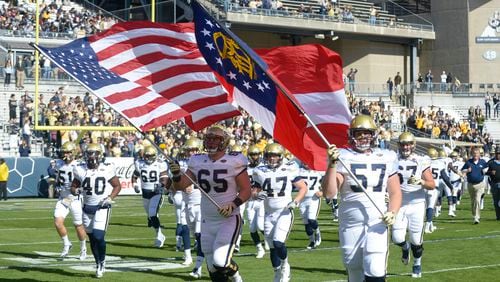Georgia Tech had hopes for a special football season, but ended up instead with a 5-6 record and no bowl trip for the second time in three years. There is no lack of reasons for how it happened, but a series this week will examine seven of them.
Among the many shortcomings for Georgia Tech on its way to its disappointing season was a shortage of depth and experience at offensive tackle. A little more than 12 months ago, though, that wouldn’t have seemed like it would be a problem for the 2017 team.
Eason Fromayan, Andrew Marshall and Trey Klock all had starting experience and had played effectively for the Yellow Jackets. Fromayan and Marshall had a year of eligibility remaining and Klock had two.
However, none of the three played a down for Tech this season. Degree in hand, Fromayan decided to forego his final year to try to get a job working on a NASCAR pit crew. Klock elected to leave Tech as a grad transfer, ultimately landing at Northwestern. Marshall suffered a foot injury in the preseason and missed the whole season.
What looked like a potential strength turned out to be, if not a liability, not a strength. Jahaziel Lee and Jake Stickler became the primary tackles, starting a combined 18 games. Will Bryan and Bailey Ivemeyer also played, starting a combined four games.
Play was inconsistent. Penalties at times were a problem. Players were slowed by injuries.
That their play didn’t match what Tech had last year doesn’t surprise, given that Lee was a sophomore and that Stickler and Ivemeyer had rarely played prior to this season. Bryan had the additional challenge of playing both tackle and guard.
If for no other reason than by providing competition and depth, the return of Fromayan and Klock and the health of Marshall would have helped. All three, and Fromayan in particular, were playing effectively at the end of the season.
Fromayan had the quickness and agility to get out and lead on tosses and to throw cut blocks at the line of scrimmage, while also having the strength for drive blocking.
Had they stayed and improved over last season, it would have been a lift for the Tech offense, which struggled in pass protection and blocking on runs to the perimeter.
The increased depth likely would have allowed Bryan to stay at guard, where he could have concentrated on rotating with Shamire Devine. Marshall could probably have spelled center Kenny Cooper, who was highly effective but likely could have used an occasional break.
Fromayan and Klock’s departures were unusual, to be certain, but a part of what makes Tech a different sort of football team than some of its competitors. Most players take their education and post-football opportunities seriously and aren’t deadset on the NFL.
Klock had an opportunity for continued playing time at Tech and left with no hard feelings. He planned to transfer closer to his home in Pennsylvania before the opportunity to enroll at a school of Northwestern's caliber arose. Fromayan had been a NASCAR fan since his childhood and, having earned his degree, was eager to pursue a career in it.
For a team that lost three games by one possession, Fromayan, Klock and Marshall would almost certainly have made a difference.
Marshall plans to return next year for his redshirt senior season.
The series will continue Tuesday.
About the Author







